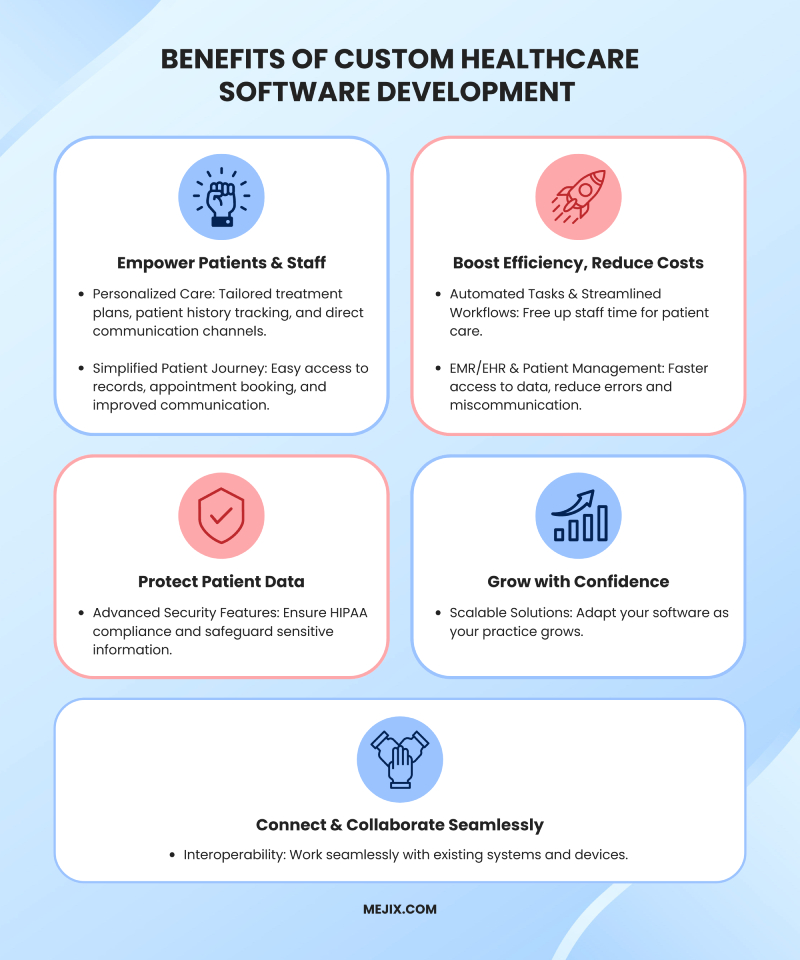How Custom Healthcare Software Development is Revolutionizing the Medical Industry
The healthcare industry has been going through significant changes in the digital era. Medical companies and institutions are embracing technological advances and implementing custom healthcare software that eases the work of healthcare providers and improves patient care.
After a few healthcare software-related projects, we wanted to share our insights into the ins and outs of custom healthcare software development. We’ll cover key benefits, the role of AI in medical software development, and the top trends shaping the medical industry in 2024.
The Shift in the Healthcare IT Industry
The healthcare field faced significant obstacles during the COVID-19 pandemic, highlighting the need for radical change in the industry.
The pandemic accelerated the adoption of digital health solutions as healthcare providers sought to minimize physical contact and manage the surge in patient numbers. This shift reflected the importance of custom software in delivering tailored, efficient, and secure healthcare services.
A report from Mordor Intelligence shows that The Healthcare IT Market size is estimated at USD 358.5 billion in 2024 and is expected to reach USD 728.63 billion by 2029, growing at a CAGR of 15.24% during the forecast period (2024-2029).
In this context, it becomes clear that custom software development services are essential for the future of healthcare.
The Benefits of Custom Software in the Healthcare Industry

Custom software solutions use the latest technologies and are tailored to meet the specific needs of healthcare providers, offering many advantages compared to off-the-shelf software. Here are some of the main benefits of custom healthcare software:
Personalized Patient Care
Custom software allows for the integration of unique features that enhance patient care, such as specialized treatment plans, patient history tracking, and personalized communication channels.
Custom solutions can also simplify the patient’s interaction with the healthcare provider.
From accessing their medical records to appointment booking, these custom features translate into convenience, increased accessibility, and improved satisfaction.
Improved Efficiency
By automating routine tasks and streamlining workflows, custom software can significantly reduce administrative burdens, allowing healthcare professionals to focus more on patient care.
Software solutions such as EMR (Electronic Medical Records), EHR (Electronic Health Records), and patient management systems enable more efficient access to patient data information, saving time and reducing the risk of potential mistakes or miscommunication.
Enhanced Data Security
Custom solutions can be designed with advanced security features to protect sensitive patient data and meet stringent regulatory requirements, such as HIPAA.
Scalability
Custom software can be developed to scale with the healthcare provider’s growth, ensuring long-term usability and cost-effectiveness.
Interoperability
Custom software can be tailored to integrate seamlessly with existing systems and devices, improving data sharing and coordination among different departments and facilities.
The Role of AI in the Healthcare Industry

With impressive data analysis and automation abilities, AI technology is becoming essential for developing custom healthcare software. Here is a glimpse into some of AI’s key benefits:
- Automation of Routine Tasks: AI can handle scheduling, billing, and data entry, reducing administrative workload.
- Enhanced Diagnostic Accuracy & Personalized Treatment Plans: AI can analyze patient medical history, lab results, and genomics to aid medical practitioners in providing accurate diagnoses and creating tailored treatment plans.
- Streamlined Clinical Workflows: AI optimizes EHR systems and provides real-time clinical decision support and healthcare analytics.
- Improved Patient Monitoring: AI enables continuous and remote patient monitoring through wearable devices, providing healthcare providers with real-time data and alerts.
- Efficient Resource Allocation: AI optimizes staff scheduling and inventory management.
- Enhanced Patient Engagement: Virtual assistants and telehealth integration improve patient interaction.
Healthcare Software Trends in 2024

From the rise of IoMT to the importance of big data analytics, here are some of the main trends shaping the healthcare industry in 2024:
Telehealth and Telemedicine
As the demand for remote healthcare services continues to grow, custom software solutions provide secure and efficient virtual care options, including telemedicine platforms, remote patient monitoring, and virtual consultations.
Remote Patient Monitoring
The market for wearable devices and IoMT (Internet of Medical Things) is growing fast. These solutions enable continuous monitoring of patient’s vital signs, improving chronic disease management and post-operative care.
Big Data Healthcare Analytics
Advanced analytics tools, such as predictive analytics and machine learning algorithms, are helping healthcare providers gain insights from large datasets.
These solutions can improve decision-making and patient outcomes, predicting risk factors and offering personalized treatment plans.
Interoperability Solutions
There is a strong focus on developing software that ensures seamless data exchange between different healthcare systems, providers, and patients. Solutions like healthcare API management and AI-driven predictive interoperability will take center stage in 2024.
Virtual and Augmented Reality
These technologies can provide a digital environment that mimics real life, ideal for medical training, patient education, and even treatment plans, such as pain management and physical therapy.
Find the Best Healthcare Software Solutions with Mejix
At Mejix, we’re fully dedicated to building exceptional custom software for your every business need.
From medical software solutions to healthcare app development, we can help your medical company offer the best patient care while staying competitive and up to date in the ever-shifting digital age.
Drop us a line and let’s get started!












